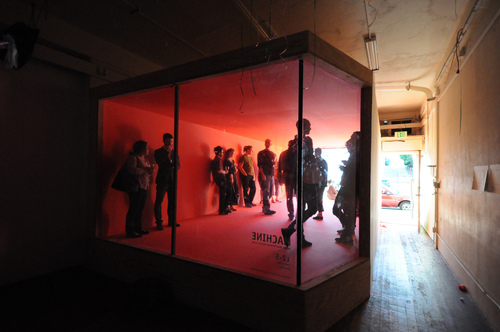As we’ve reminded you over and over by now, this month marks the Believer’s ten-year anniversary. In the spirit of the occasion, we wanted to look at some other entities that turn ten this year. The Echo Park, Los Angeles arts space Machine Project produces an inimitable series of talks and readings, classes, exhibitions, and all sorts of interdisciplinary in-between. The organization’s founder, Mark Allen, recently told Machine Project’s origin story to the writer Kate Wolf.

MARK ALLEN: I was looking for a place to live on the East Side, and while apartment searching I saw the Machine Project storefront for rent; I think it was $1,100 a month. I kind of rented it on instinct. I thought it looked like a space that something interesting could happen in. One of my things about C-Level [another space Allen was previously involved with] was that though I loved the kind of drama of this thing in the basement, it was really hard to imagine how someone who didn’t already know about it would find it. And our current storefront was just really appealing because it has this big window and you can see what’s going on [from the street]. It seemed a lot better for people discovering it. At the time, I was really interested in a transdisciplinary audience; I was thinking a lot about what you could do to have different communities of interest experience something that wasn’t their core practice—scientists at poetry readings, poets at a science talk, etc. Based on that, I started having people do stuff; I’d invite people I met who seemed interesting to speak or perform. I did that for two or three years, roughly once a week.
At that time I was adjunct teaching a little, but I didn’t have much income and most of it was going into paying the rent at Machine. I was doing work with engineering then and a lot of artists were interested in it, so I started teaching electronics and programming classes as a way of helping to pay the rent on the space. I did that for a while and by then I’d identified a couple potential grants and turned Machine into a 501c3. We got a grant from the Durfee Foundation, which we used to hire Michelle Yu, who was the first employee, and she wrote a lot more grants and helped us develop more of an organizational structure.
Since then, I think over the course of time it just continues to change in ways I don’t necessarily plan. In the beginning it was like a container for different people to share ideas in; over time, I started collaborating with some of...
You have reached your article limit
Sign up for a digital subscription and continue reading all new issues, plus our entire archives, for just $1.50/month.
Already a subscriber? Sign in




